Karolina Hird
Ukrainian forces continued offensive operations near Bakhmut and in western Zaporizhia Oblast on September 7 and made further gains on both sectors of the front. Geolocated footage published on September 7 indicates that Ukrainian forces have made further advances northwest of Verbove (18km southwest of Orikhiv) in western Zaporizhia Oblast.[1] A prominent Russian milblogger claimed that Ukrainian forces made further advances in the area and other milbloggers claimed that Ukrainian forces temporarily advanced to the northwestern outskirts of Verbove on September 6, likely indicating further recent Ukrainian advances northwest of the settlement.[2] Satellite imagery collected on September 6 shows burning foliage in a tree line roughly a kilometer northwest of Verbove, suggesting that Russian forces are firing on advancing Ukrainian forces in the area.[3] Geolocated footage published on September 7 indicates that Ukrainian forces have made marginal gains northwest of Klishchiivka (7km southwest of Bakhmut).[4] The Ukrainian General Staff reported that Ukrainian forces achieved unspecified successes south of Bakhmut and near Robotyne (10km south of Orikhiv) and Verbove in western Zaporizhia Oblast.[5]
US Defense Intelligence Agency (DIA) Director of Analysis Trent Maul stated that there is a “realistic possibility” that Ukrainian forces will break through the entire Russian defense in southern Ukraine by the end of 2023, while a Ukrainian source suggested that upcoming Russian defensive positions are weaker than those Ukrainian forces have previously breached. Maul stated on September 6 in an interview with the Economist that the recent Ukrainian breach of the “first” of three Russian defensive layers in southern Ukraine gives Ukrainian forces a “realistic possibility” to break through the remaining series of Russian defensive positions by the end of 2023.[6] Maul stated that Ukrainian forces have also advanced into the “second” Russian defensive layer, likely referring to recent advances by light Ukrainian infantry past the series of Russian defensive positions that run northwest of Verbove to north of Solodka Balka (20km south of Orikhiv) in western Zaporizhia Oblast.[7] Former Ukrainian Aidar Battalion Commander Yevhen Dykyi stated on September 4 that battles are already ongoing at these Russian defensive positions but that Ukrainian forces have not yet broken through them.[8] Dykyi stated that the minefields ahead of the upcoming Russian defensive layer are not continuous, consistent with previous Ukrainian statements suggesting that Ukrainian forces have already advanced through the densest minefields.[9] Dykyi stated that Russia’s “third” defensive layer in southern Ukraine is primarily comprised of command posts, communication points, and warehouses and mainly acts as a support line for the Russian defensive positions further north.[10] Dykyi argued that Russian forces will not be able to hold back Ukrainian advances at this “third“ series of Russian defensive positions, implying that a definitive Ukrainian breach of the current Russian defensive layer would be operationally decisive. However, Maul notably stated that the bulk of Russian reinforcements are deployed to the “third” Russian defensive layer, contradicting Dykyi’s suggestion that these positions are merely supportive in nature.[11] The subsequent series of Russian defensive positions may be weaker, less mined, and less manned than the defensive layer that Ukrainian forces have breached. Russian defenses are not uniform across the front in southern Ukraine, however, and assessments of the strength of subsequent Russian defensive positions may be extrapolations based on limited information from small sectors of the front. Ukrainian forces are making tactical gains and successfully attriting defending Russian forces and ISW continues to assess Ukraine’s counteroffensive may achieve operational successes in 2023, but subsequent series of Russian defensive positions still pose significant challenges for Ukrainian forces and may in sections be strongly held.
Russian forces conducted another large-scale Shahed-136/131 drone attack against Sumy and Odesa oblasts overnight on September 6-7. Ukrainian Air Force Command stated that Russia launched 33 Shaheds in several groups from the northern, southeastern, and southern directions, predominantly aimed at grain infrastructure in Odesa Oblast, and that Ukrainian forces destroyed 25 of the drones.[12] Geolocated footage posted on September 7 shows the aftermath of the Shahed strike on port infrastructure in Kiliya, Odesa Oblast.[13] Ukrainian Southern Command Spokesperson Captain First Rank Nataliya Humenyuk noted that Russia is increasingly using such loitering munitions because they are cheaper to manufacture than missiles and are available in larger quantities.[14]
Moscow Oblast authorities detained the commander of the 1st Special Purpose Air and Missile Defense Army on bribery and corruption charges amidst continued and escalating drone attacks on Moscow. Russian media reported on September 7 that the Moscow Garrison Military Court detained Major General Konstantin Ogienko for bribery and noted that 4th Air Defense Division Commander Major General Dmitry Belatsky organized the allocation of state defense property to an unnamed civilian organization in collusion with Ogienko.[15] The 1st Special Purpose Air and Missile Defense Army, including its 4th Air Defense Division, is notably responsible for the air defense of Moscow City and the surrounding oblast. Drone strikes on Moscow Oblast have recently become more prevalent, and it is likely that command changes resulting from a bribery case against top commanders of one of the most elite elements of Russia’s domestic air defense could further complicate Moscow’s ability to defend against such attacks. While ISW has not observed evidence to suggest that Ogienko was detained for reasons other than bribery charges, Russian sources have recently complained that Russian air defense elements are responsible for failing to curb increased drone attacks on Moscow, and Ogienko’s removal could be a response to such allegations.[16]
Russian President Vladimir Putin promoted three Russian generals, including Central Military District (CMD) and Russian Central Grouping of Forces in Ukraine Commander Colonel General Andrey Mordvichev, on September 6. Putin promoted Mordvichev and 8th Combined Arms Army (Southern Military District) Commander Gennady Alashkin to the rank of colonel general, and Ministry of Defense (MoD) Main Armored Directorate Head Alexander Shestakov to the rank of lieutenant general.[17] The Central Grouping of Forces is primarily committed in Ukraine on the Kupyansk-Svatove-Kreminna line, and the 8th CAA is currently deployed near Bakhmut and on the Avdiivka-Donetsk City line. [18]These promotions award each general with a rank that corresponds with his current command and are not necessarily unusual. Putin likely awarded these promotions now to reward loyalty and obedience to the senior Russian military command, rather than to recognize battlefield performance or particular responsibilities. Putin has previously publicly lauded Mordvichev, indicating that Mordvichev may hold more of Putin’s favor than other military district commanders, as ISW has previously assessed.[19]
Russian sources accused Armenian authorities of detaining a pro-Russian blogger in Goris, Armenia, on September 6. Head of Rossotrudnichestvo (Russian Federal Agency for the Commonwealth of Independent States Affairs, Compatriots Living Abroad, and International Humanitarian Cooperation) Yevgeny Primakov claimed that “unknown masked men” abducted pro-Russian blogger Mikayel Badalyan in Goris on the night of September 6.[20] Primakov noted he had interviewed Badalyan on a Radio Sputnik segment the day before and that Badalyan criticized the Armenian government for its “anti-Russian policy.”[21] Sputnik Armenia also noted that Armenian authorities also detained columnist Ashot Gevorgyan in Goris.[22] Badalyan’s and Gevorgyan’s alleged arrests occurred against the backdrop of increasing tensions between Armenia and Russia, with Armenia beginning to deliver humanitarian aid to Ukraine for the first time, preparing for joint military exercises with the US, and Armenian Prime Minister Nikol Pashinyan publicly questioning Armenia’s historical reliance on Russia for security guarantees.[23] Russian Foreign Ministry Spokesperson Maria Zakharova responded to the incident and called it a “provocation” aimed at further spoiling the relationship between Russia and Armenia.[24]
The Russian Central Election Commission (CEC) cancelled regional elections in some areas in Russia near the Ukrainian border for the first time. Russian CEC Head Ella Pamfilova announced on September 7 the cancellation of local elections in Shebekino Raion and the village of Zhigailovsky in Belgorod Oblast due to the “high alert” regime in the area.[25] Russian authorities previously passed a law in May 2023 authorizing the CEC to cancel elections in certain areas under martial law.[26] The CEC likely cancelled these elections due to prior criticism of evacuations from Shebekino and the possibility that there may not be enough civilians remaining in Shebekino to portray these elections as legitimate.[27]
Key Takeaways:
- Ukrainian forces continued offensive operations near Bakhmut and in western Zaporizhia Oblast on September 7 and made further gains on both sectors of the front.
- US Defense Intelligence Agency (DIA) Director of Analysis Trent Maul stated that there is a “realistic possibility” that Ukrainian forces will break through the entire Russian defense in southern Ukraine by the end of 2023, while a Ukrainian source suggested that upcoming Russian defensive positions are weaker than those Ukrainian forces have previously breached.
- Ukrainian forces are making tactical gains and successfully attriting defending Russian forces and ISW continues to assess Ukraine’s counteroffensive may achieve operational successes in 2023, but subsequent series of Russian defensive positions still pose significant challenges for Ukrainian forces and may in sections be strongly held.
- Russian forces conducted another large-scale Shahed-136/131 drone attack against Sumy and Odesa oblasts overnight on September 6-7.
- Moscow Oblast authorities detained the commander of the 1st Special Purpose Air and Missile Defense Army on bribery and corruption charges amidst continued and escalating drone attacks on Moscow.
- Russian forces continued offensive operations along the Kupyansk-Svatove-Kreminna line, in the Bakhmut direction, along the Avdiivka-Donetsk City line, and in the Donetsk-Zaporizhia Oblast border area but did not make any confirmed advances on September 7.
- Russian Main Effort – Eastern Ukraine (comprised of two subordinate main efforts)
- Russian Subordinate Main Effort #1 – Capture the remainder of Luhansk Oblast and push westward into eastern Kharkiv Oblast and encircle northern Donetsk Oblast
- Russian Subordinate Main Effort #2 – Capture the entirety of Donetsk Oblast
- Russian Supporting Effort – Southern Axis
- Russian Mobilization and Force Generation Efforts
- Activities in Russian-occupied areas
Russian Main Effort – Eastern Ukraine
Russian Subordinate Main Effort #1 – Luhansk Oblast (Russian objective: Capture the remainder of Luhansk Oblast and push westward into eastern Kharkiv Oblast and northern Donetsk Oblast)
Russian forces continued limited offensive operations along the Kupyansk-Svatove-Kreminna line and did not make any claimed or confirmed advances on September 7. The Ukrainian General Staff reported that Russian forces conducted unsuccessful offensive operations near Synkivka (9km northeast of Kupyansk) and Novoyehorivka (15km southwest of Svatove).[28] A Russian milblogger also reported Russian attacks near Novoyehorivka and Novoselivske (16km northwest of Svatove).[29] Ukrainian Eastern Group of Forces Spokesperson Ilya Yevlash stated on September 6 that Russian forces are conducting an operational pause after experiencing failure near Novoyehorivka and are forming new combat-ready units from previously defeated units for further attacks.[30]
Russian sources claimed that Ukrainian forces continued offensive operations along the Kupyansk-Svatove-Kreminna line and reportedly advanced on September 7. A Russian milblogger claimed that Ukrainian forces recaptured unspecified positions in the Serebryanske forest area near Shyplivka (about 10km south of Kreminna).[31] The Russian Ministry of Defense (MoD) claimed that Russian forces repelled Ukrainian attacks near Kyslivka (20km southeast of Kupyansk) and Dibrova (7km southwest of Kreminna).[32]
Russian Subordinate Main Effort #2 – Donetsk Oblast (Russian objective: Capture the entirety of Donetsk Oblast, the claimed territory of Russia’s proxies in Donbas)
Ukrainian forces continued offensive operations in the Bakhmut direction on September 7 and advanced south of Bakhmut. Geolocated footage posted on September 7 of the Luhansk People’s Republic (LNR) 4th Motorized Rifle Brigade striking Ukrainian positions shows that Ukrainian forces have marginally advanced northwest of Klishchiivka (about 5km southwest of Bakhmut).[33] The Ukrainian General Staff reported that Ukrainian forces advanced on Bakhmut’s southern flank, and Ukrainian Eastern Group of Forces Spokesperson Ilya Yevlash noted on September 6 that Ukrainian forces advanced near Klishchiivka.[34] The Russian Ministry of Defense (MoD) claimed that Russian forces repelled Ukrainian attacks near Klishchiivka and Andriivka (9km southwest of Bakhmut).[35]
Russian forces continued offensive operations in the Bakhmut direction and did not make any claimed or confirmed advances on September 7. The Ukrainian General Staff reported that Russian forces attacked near Orikhovo-Vasylivka (13km northwest of Bakhmut) and Klishchiivka.[36] A Russian milblogger claimed that Russian forces counterattacked near Klishchiivka, Kurdyumivka (12km southwest of Bakhmut), and Zalizyanske (10km northwest of Bakhmut) but did not specify the outcome of these attacks.[37]
Ukrainian forces did not conduct any claimed or confirmed offensive operations along the Avdiivka-Donetsk City line on September 7.
Russian forces conducted ground attacks along the Avdiivka-Donetsk City line on September 7 and did not make any claimed or confirmed advances. The Ukrainian General Staff reported that Ukrainian troops repelled Russian attacks north of Donetsk City near Avdiivka and Novokalynove (12km northwest of Avdiivka) and on the southwestern outskirts of Donetsk City near Marinka and Krasnohorivka.[38] A Russian milblogger advertised an equipment crowdfunding campaign for soldiers of the 103rd Motorized Rifle Regiment (150th Motorized Rifle Division, 8th Combined Arms Army, Southern Military District), who are reportedly fighting in the Marinka area.[39]
Russian Supporting Effort – Southern Axis (Russian objective: Maintain frontline positions and secure rear areas against Ukrainian strikes)
Russian sources claimed that Ukrainian forces continued offensive operations along the administrative border between Donetsk and Zaporizhia oblasts on September 7 but did not advance. The Russian Ministry of Defense (MoD) claimed that Russian forces repelled Ukrainian assaults near Novomayorske (18km southeast of Velyka Novosilka).[40] Russian sources claimed that elements of the Russian 40th Naval Infantry Brigade (Pacific Fleet) and the 37th Motorized Rifle Brigade (36th Combined Arms Army, Eastern Military District) repelled Ukrainian assaults along the Novodonetske-Novomayorske (12km to 18km southwest of Velyka Novosilka) line.[41] The Russian “Vostok” Battalion and its commander Alexander Khodakovsky, who are defending in the area, claimed that Russian forces periodically retreat to tactical rear areas before restoring their original positions and that Ukrainian and Russian forces periodically exchange control over advance positions along the Novodonetske-Novomayorske line.[42] Russian milbloggers claimed that Ukrainian forces also attacked Russian positions near Urozhaine (9km south of Velyka Novosilka) and amplified footage purporting to show elements of the Russian 336th Naval Infantry Brigade (Baltic Fleet) operating near Pryyutne (15km southwest of Velyka Novosilka).[43]
Russian forces conducted limited unsuccessful ground attacks in the Donetsk-Zaporizhia Oblast border area on September 7. The Ukrainian General Staff reported that Ukrainian forces repelled Russian assaults near Prechystivka (18km southwest of Velyka Novosilka).[44]
Ukrainian forces continued counteroffensive operations in western Zaporizhia Oblast on September 7 and advanced. Geolocated footage published on September 7 indicates that Ukrainian forces have made further advances northwest of Verbove (18km southwest of Orikhiv).[45] A prominent Russian milblogger claimed that Ukrainian forces made further advances in the area and other milbloggers claimed that Ukrainian forces temporarily advanced to the northwestern outskirts of Verbove on September 6, likely indicating further recent Ukrainian advances northwest of the settlement.[46] A Russian milblogger claimed that Russian forces pushed Ukrainian forces back from the northwestern outskirts of Verbove, but ISW has not observed that Ukrainian forces hold positions close enough to the northwestern outskirts of Verbove for Russian forces to have repelled them from the outskirts to begin with.[47] Satellite imagery collected on September 6 shows burning foliage in a tree line roughly a kilometer northwest of Verbove, suggesting that Russian forces are firing on advancing Ukrainian forces in the area.[48] Ukrainian Tavriisk Group of Forces Spokesperson Oleksandr Shtupun stated that Ukrainian forces advanced south of Robotyne and west of Verbove on September 6.[49] A Russian milblogger claimed that Ukrainian forces attempted to break through Russian defenses east of Novoprokopivka (13km south of Orikhiv) and made unspecified gains in the area.[50] Russian sources claimed that Russian forces continued to repel mechanized Ukrainian assaults along the Robotyne-Verbove line.[51]
A Russian milblogger claimed that Ukrainian forces resumed offensive operations west of Orikhiv in western Zaporizhia Oblast and advanced on September 7, but ISW cannot confirm these initial reports at this time. The milblogger claimed that Ukrainian forces resumed offensive operations near Kamianske (31km southwest of Orikhiv) and made unspecified gains in the direction of Luhove (30km southwest of Orikhiv).[52] The milblogger also claimed that Ukrainian forces expanded their control along an unspecified part of the left (southern) bank of the Yanchokrak River.[53] The Russian milblogger has made previous accurate claims about Ukrainian offensive activity in western Zaporizhia Oblast in advance of other milbloggers, although he has also promoted intentionally false information in the past as well.
A prominent Russian milblogger claimed that Ukrainian forces continued limited activity on islands in the Dnipro River delta. The milblogger claimed that two Ukrainian landing groups with about three dozen personnel in total advanced from the northern part of Perevalsky Island (west of Nova Kakhovka) but that Russian artillery and tank units on the left bank of the Dnipro River pushed Ukrainian forces back to the northern part of the island.[54]
Russian Mobilization and Force Generation Efforts (Russian objective: Expand combat power without conducting general mobilization)
Russian independent media outlet Cherta reported on September 6 that the increased demand for Russian defense industrial base (DIB) workers since the beginning of the war in Ukraine has not led to increased salaries.[55] Cherta interviewed several Russian DIB workers and discovered that increased working hours, instead of higher wages, are responsible for the claimed increase in Russian DIB salaries to up to 200 thousand rubles ($2,030) per month.[56] Russian authorities have repeatedly lauded the Russian DIB for its claimed successes and Russian President Vladimir Putin even signed a decree on August 9 creating the title of “Honored Worker of the Defense Industry Complex of the Russian Federation.”[57]
Activities in Russian-occupied areas (Russian objective: Consolidate administrative control of annexed areas; forcibly integrate Ukrainian citizens into Russian sociocultural, economic, military, and governance systems)
The Ukrainian Security Service (SBU) reportedly coordinated the attempted assassinations of five Russian military and security personnel in occupied Oleshky, Kherson Oblast. Ukrainian news outlet Ukrainska Pravda reported on September 7 that SBU officials coordinated an improvised explosive device (IED) attack against a car carrying two Russian Federal Security Service (FSB) officers and three Russian military personnel, killing one FSB officer and wounding the remaining four passengers.[58] Ukrainska Pravda included footage of the car exploding.[59] Ukrainska Pravda reported that the FSB officers were visiting Oleshky from Skadovsk to assist occupation officials with the filtration and torture of Ukrainian locals.[60]
Ukrainian sources reported on Russian efforts to create a guise of legitimacy around sham elections in occupied regions of Ukraine. The Ukrainian Resistance Center reported on September 7 that Russian authorities are allowing early voting days in the occupied territories in order to excuse empty polling stations on official voting days (September 8-10) by claiming that locals voted early.[61] The Ukrainian Resistance Center also reported that Russian authorities are planning to distribute food and gather students from “volunteer movements,” public servants, and tourists from Russia at polling stations to make the stations appear busier on official voting days.[62] Kherson Oblast occupation head Vladimir Saldo declared September 8 a holiday in an attempt to increase voter turnout in Kherson Oblast.[63] Ukrainian Kherson Oblast Administration Advisor Serhiy Khlan stated on September 6 that Kherson Oblast occupation authorities are bringing in people from Crimea and Russia to vote in Kherson Oblast because locals refuse to participate in the rigged elections.[64]
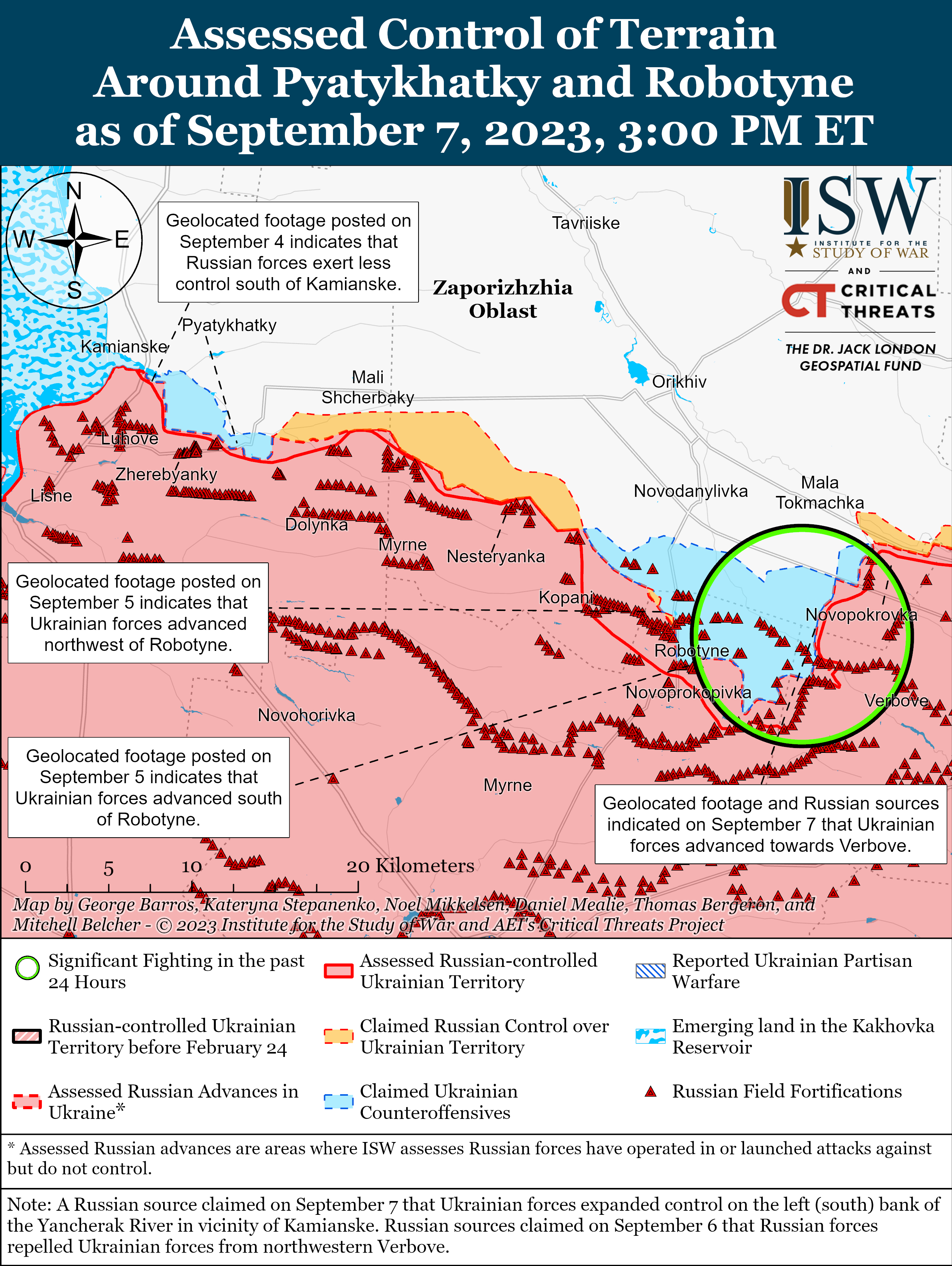

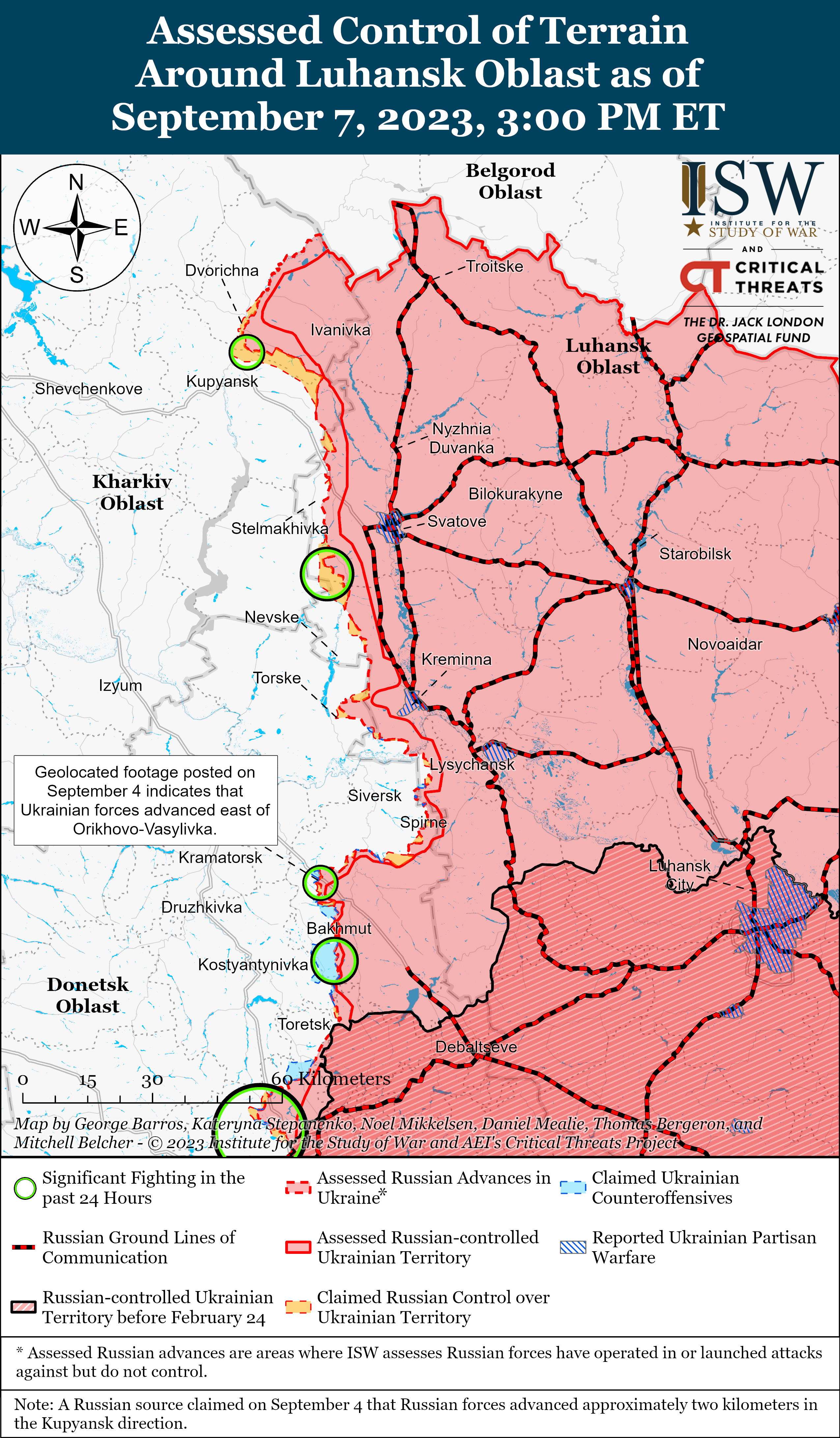
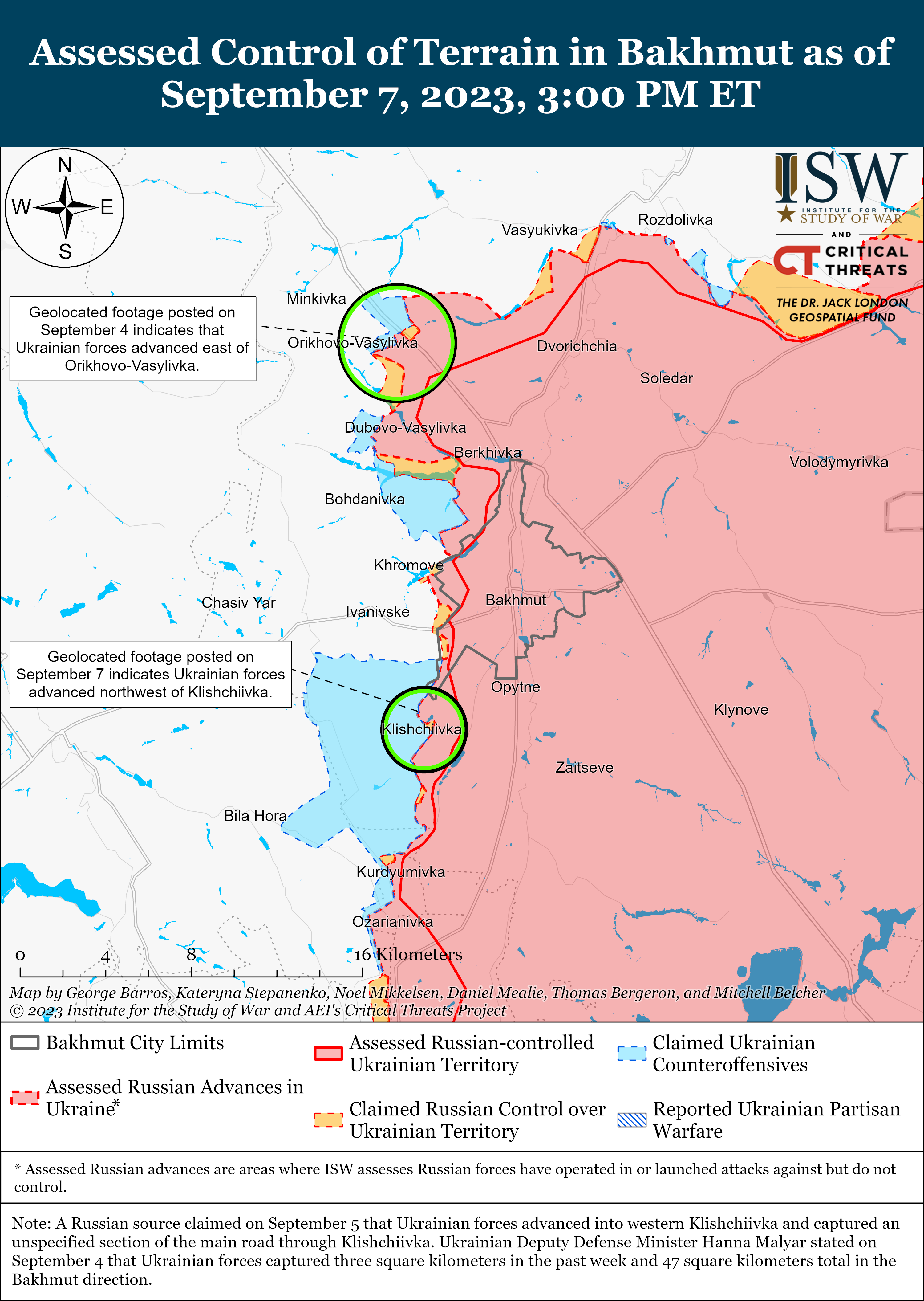
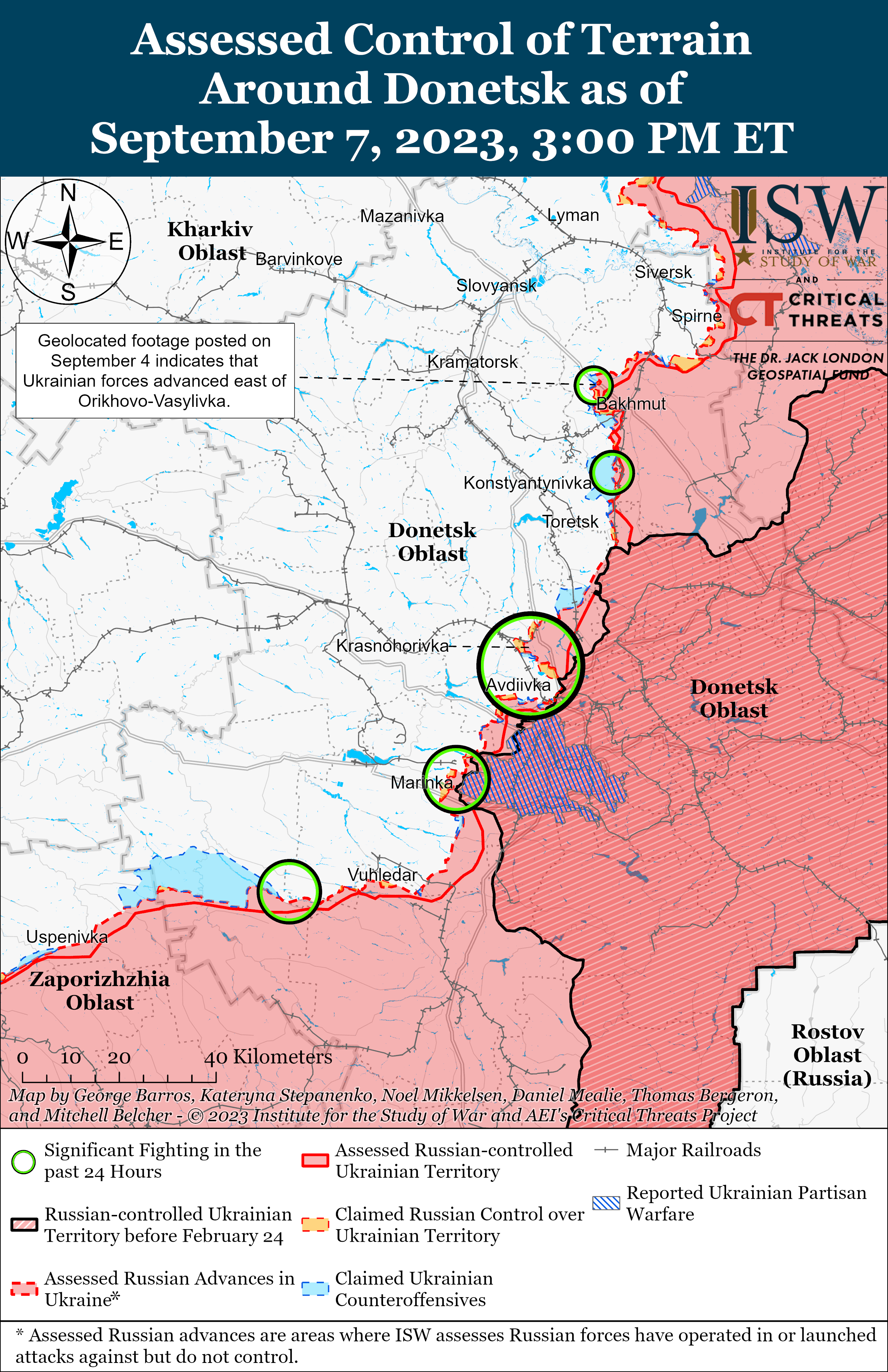
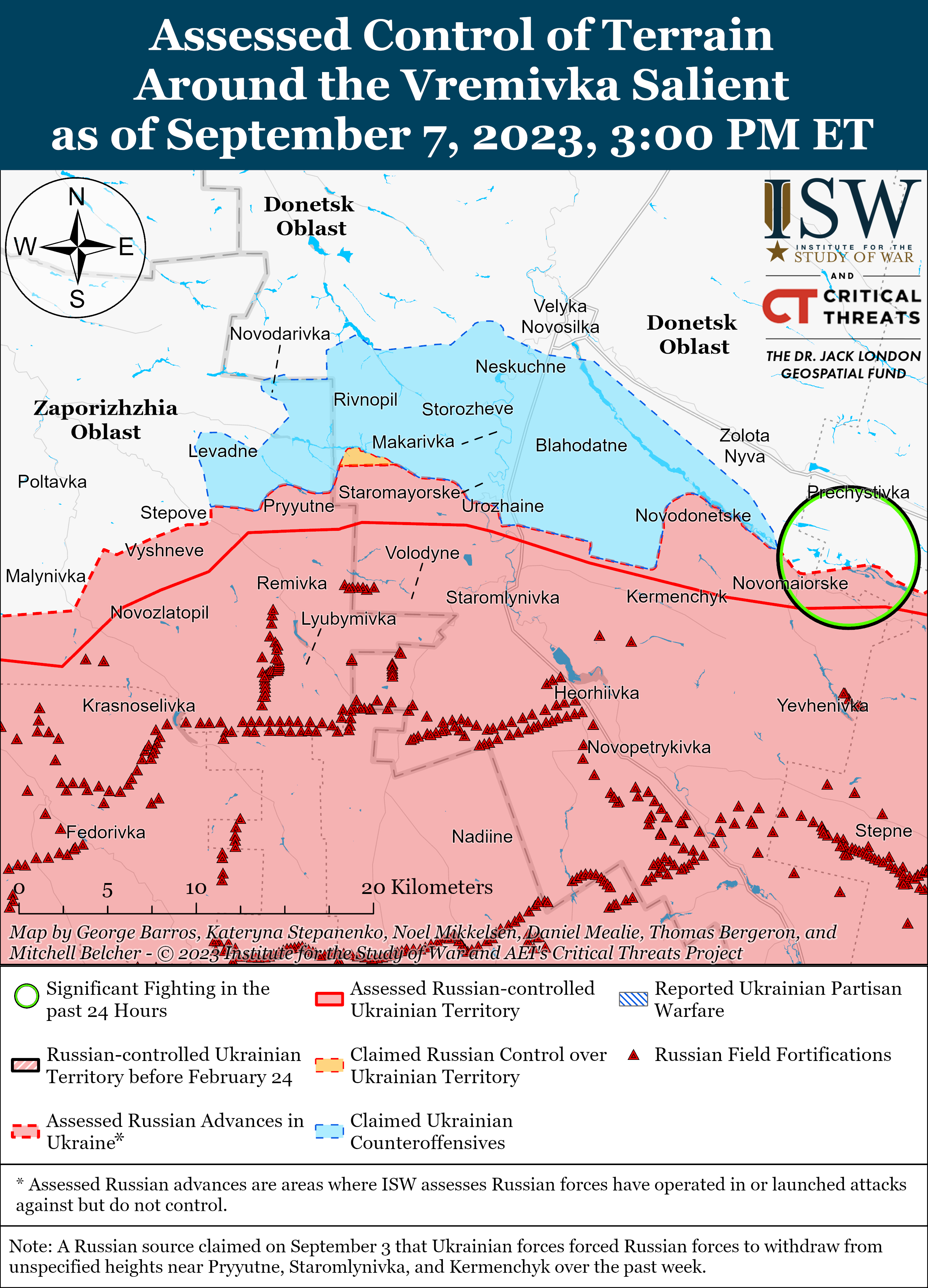
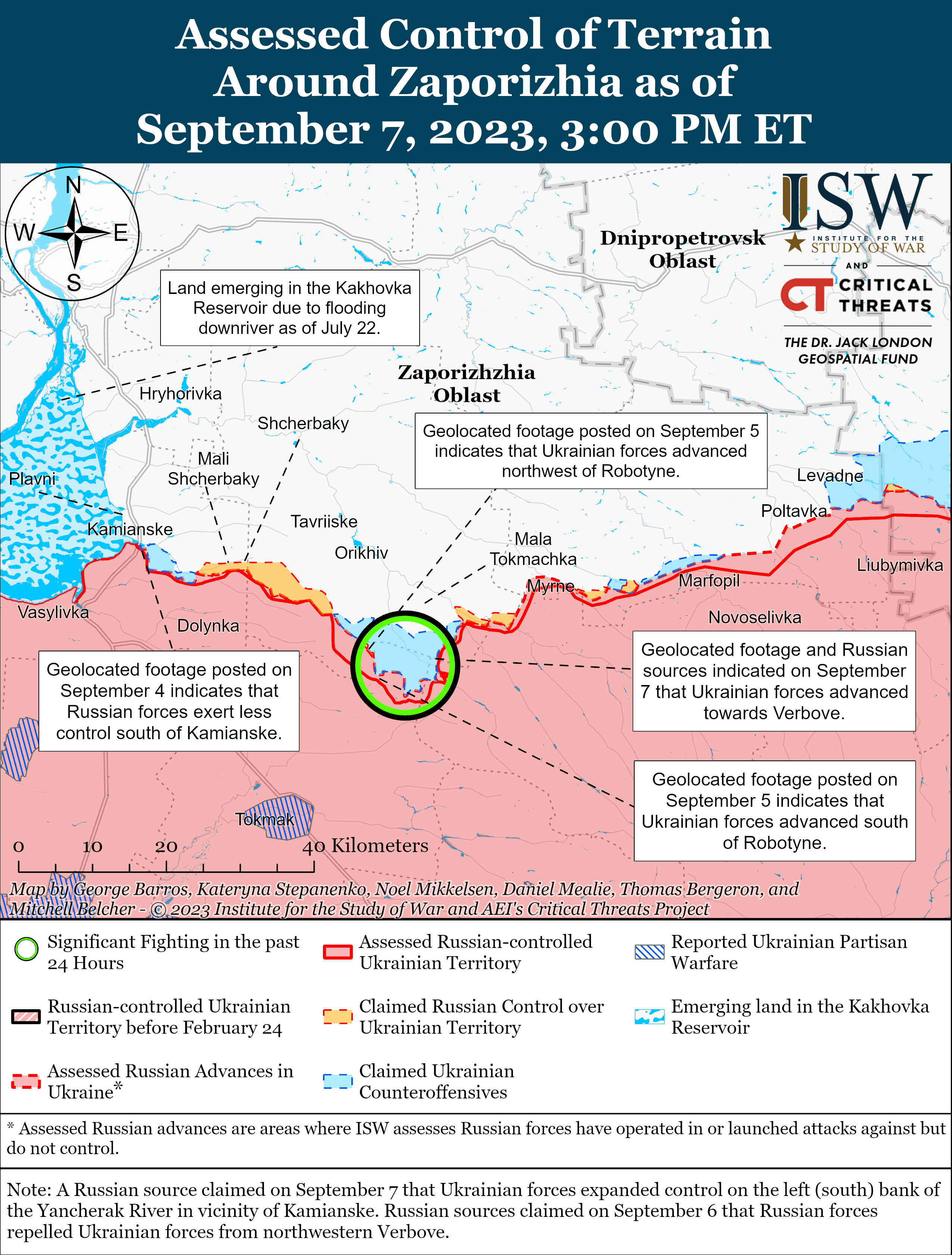
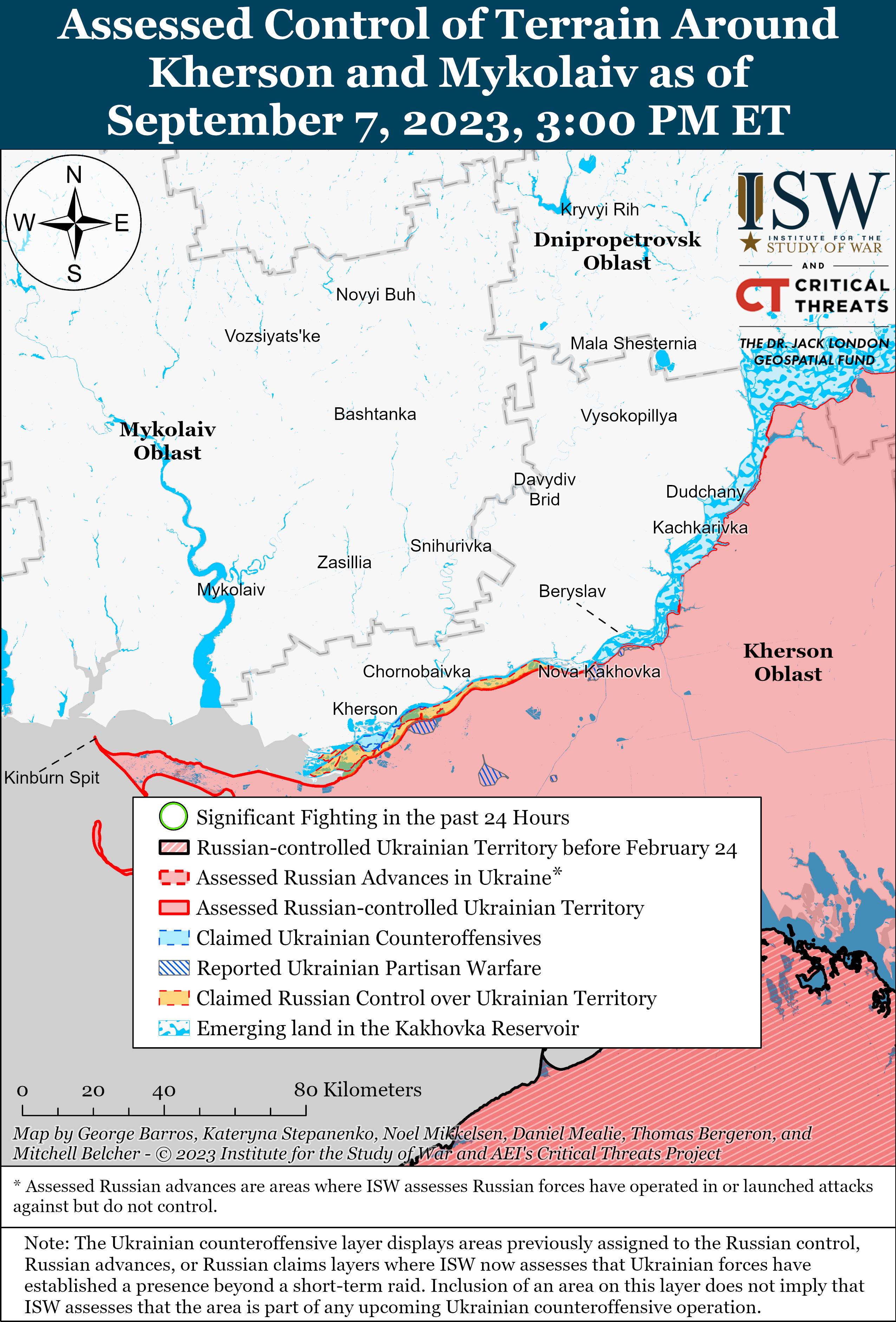
No comments:
Post a Comment